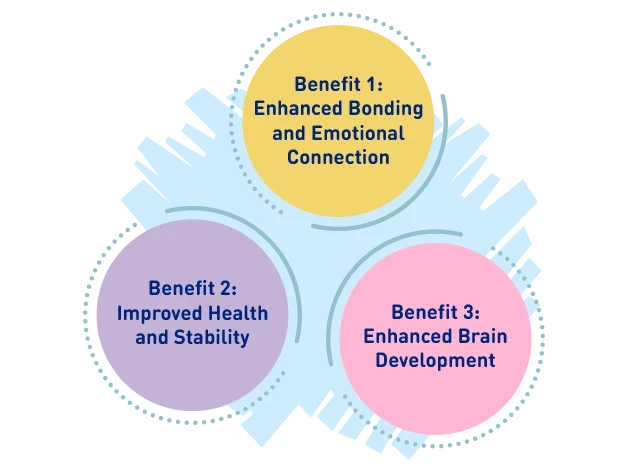Due to maintenance, rewards points for receipt uploads will be delayed. Thank you for your patience!

Kangaroo Care is a method that can help you bond with your baby and promote their development. Lay your diapered baby on your bare chest so that they can feel the skin-to-skin contact.
In the late 1970s, the Instituto Materno Infantil in Bogotá, Colombia was the country's largest neonatal unit, and the hospital was overwhelmed delivering 30,000 babies every year.1 Despite the hospital staff's best efforts, overcrowded incubators and rampant infection made it difficult to save babies who were born prematurely, until Dr. Edgar Rey happened to come across a paper about how kangaroos are born.
Bald and peanut-sized, kangaroo babies are born immature and need special care, much like a preterm human baby. But the baby kangaroos are able to stay warm in their mother's pouch, where they enjoy skin-to-skin contact and unlimited access to milk until they grow large enough to emerge. Dr. Rey wondered if there would be any benefit to human babies if their mothers carried them in a similar fashion–and it certainly did.
Death rates plummeted immediately, space freed up in the incubators, and more and more mothers were going home with their babies as the practice was adopted throughout the hospital–and soon, the world.

Kangaroo Care promotes a strong bond between you and your baby. The close physical contact releases hormones like oxytocin, often referred to as the "love hormone." This hormone fosters feelings of love, affection, and attachment, helping you and your baby form a deep emotional connection–and can reduce mom's stress as much as baby's!2
Skin-to-skin contact through Kangaroo Care has been shown to stabilize a premature baby's heart rate, breathing patterns, and body temperature.3
Kangaroo Care has a positive impact on a baby's brain development.4 The sensory stimulation from being held skin-to-skin helps the baby's brain develop regulatory abilities and secure attachment.
A common misconception is that only mothers can or should provide kangaroo care–it's also beneficial for babies to experience kangaroo care with dad! Your baby's grandparents, older siblings, and other family members can also provide kangaroo care to bond with the baby.
While Kangaroo Care is generally safe and beneficial, it is essential to first seek guidance from your baby's doctors and nurses to ensure Kangaroo Care is appropriate for your baby's specific health condition and needs.
Enfamil Family Beginnings® is here to provide you with the resources, expert advice, and exclusive offers you need as you navigate the world of parenting a premature baby. You'll receive helpful resources that can assist you in providing the best care for your NICU baby. From educational materials to personalized tips, we're dedicated to supporting you every step of the way. Plus, you'll have access to exclusive offers and savings on Enfamil products such as Enfamil® NeuroPro® EnfaCare® Infant Formula, ensuring that your little one receives the nutrition they need to thrive. Together, we'll celebrate every milestone, triumph over challenges, and cherish the incredible bond between you and your little one.
References
All information on Enfamil, including but not limited to information about health, medical conditions, and nutrition, is intended for your general knowledge and is not a substitute for a healthcare professional's medical identification, advice, or management for specific medical conditions. You should seek medical care and consult your doctor or pediatrician for any specific health or nutrition issues. Never disregard professional medical advice or delay seeking medical treatment, care, or help because of information you have read on Enfamil.